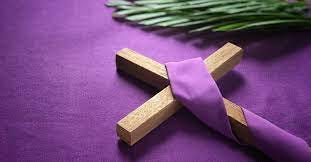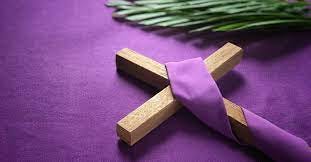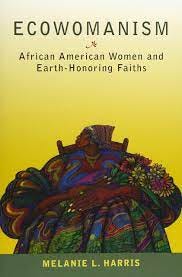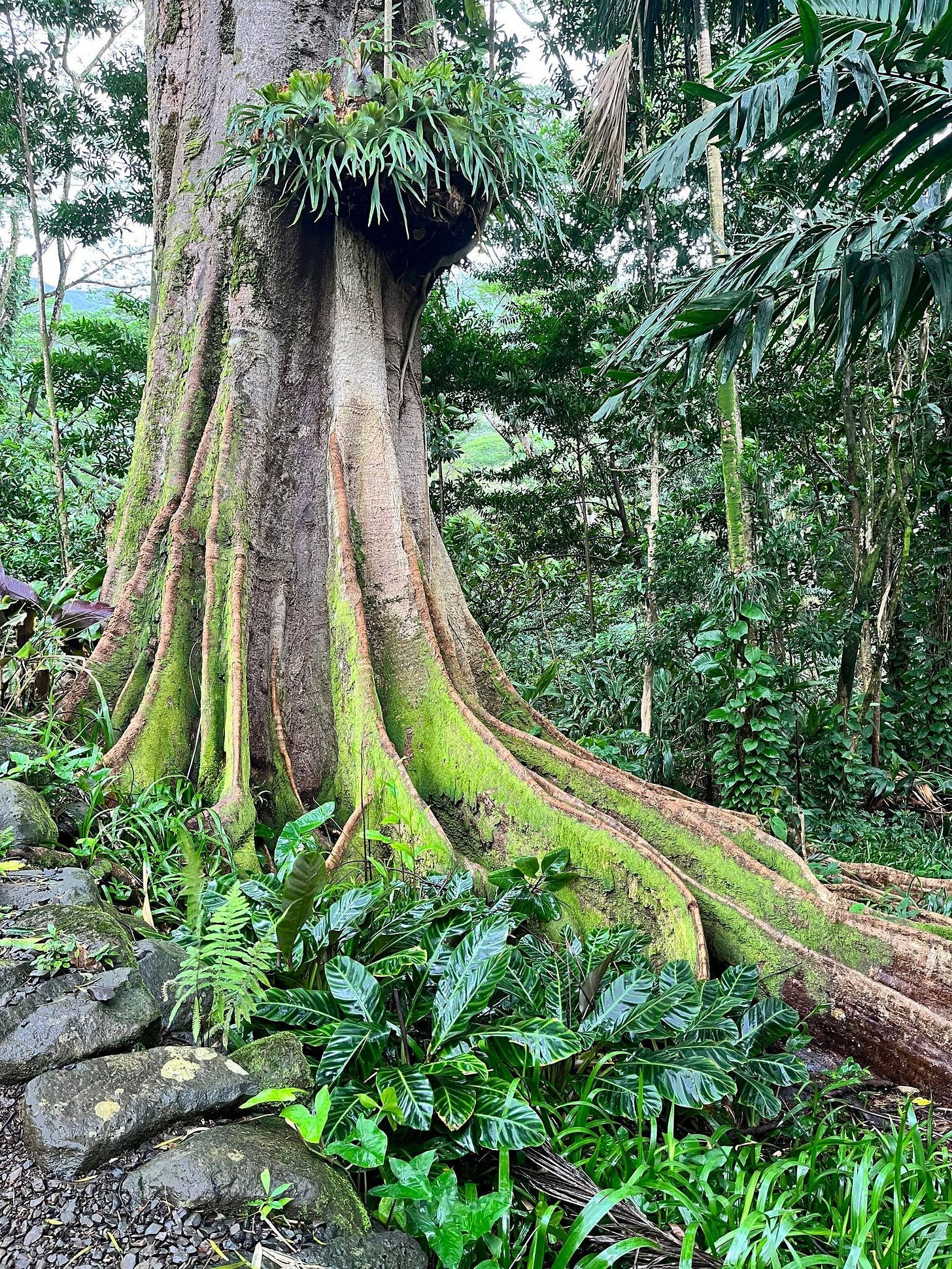Observing Lent, and Black Women's History Week
It is now the season of Lent, begun with the marking of ashes on our foreheads on Ash Wednesday, when we were reminded that we are dust, and to dust we will return. This is when we are reminded of our mortality, of our earthly, fleshly bodies. It is a season of reflection, a season of evaluating and re-evaluating how we are living our lives in relationship with God and the world, as we wait for and move toward Holy Week, the time of Jesus’ suffering and death, and his resurrection as the Son of God.
There are many interpretations of Lent and of the events that occur in Holy Week and at Easter. There are also many traditions for observing Lent. A subscriber asked me recently if I could offer some ideas for observing Lent this year, in a way that they might find meaningful. I want to offer you three ideas, each in a different category of observation, in light of the climate crisis.
Give Something Up: The Status Quo
The first idea is to give something up. This is what we most often think of in Lent: are we going to give up chocolate? Wine? Social media? While you may want to give up a favourite treat, perhaps consider, instead, giving up the status quo. What in your life, in your actions, lifestyle choices, or thoughts, represents the status quo, the way things ‘always are’, that is harming the planet, and keeping us from effective climate action? Jesus went against the status quo at every turn, aligning himself and others with love, compassion, justice, and mercy. Where do you need to give up the status quo this Lent? What is a concrete, specific action, choice, or thought that you need to practice giving up for the 40 days of Lent?
Something to Reflect On: Relationship with the Earth Community
My second idea for Lent is finding something specific to reflect upon in your life. This is a season of introspection, and so this year, what do you need to reflect upon? I invite you to choose something specific to you and your relationship with the Earth community. Take time each day, from now until Easter, to reflect upon what your relationship with the Earth community is like right now, and how it can be strengthened. I don’t mean this in the abstract; my suggestion is that you look at the specific relationship you have with the world outside your door. Or in your watershed. With the lake or river nearby, or the woodlot out back. With the animals that seem like a nuisance in the city, but who actually have always been there, and it’s us who are encroaching on their habitat. Reflect upon your relationship with the Earth community in a specific way this Lent. And, if you are thinking, “but I don’t have a relationship with nature right now!” then reflect on that reality, and how you might develop on.
Something to Do: Outside of Your Usual Actions
My third idea for Lent this year is to go out and do something. Find something to do that invites you into a deeper relationship with God and the meaning of Jesus’ death and resurrection. Is it time for you to, finally, join a climate activist organization and go protest? Contact your local elected officials and ask them what they are doing to fight climate change? Go for daily walks on the same trail, and pay attention to what you notice, and the changes, from day to day? My specific suggestion is that you choose something that is outside the norm for your usual actions. If you are not usually an activist, maybe it’s time to become one. If you are an activist but are so busy that you don’t get outside enough, maybe it’s time for that daily walk. Do something that stretches you and invites you into this time of introspection and renewal before God.
Black History Month: Black Women's History Week
Feminista Jones. Find her on IG: https://www.instagram.com/feministajones/
Because March is Women’s History Month, this last week of February in Black History Month is also called Black Women’s History Week (February 25 – March 3). Black Women’s History Week was created by Feminista Jones, a Black American social worker and writer on Black feminism.
For Black Women’s History Week, I want to introduce you to a strand within theology that may be unfamiliar to you: ecowomanist theology.
Let me explain its component parts. Womanism, a term coined by author Alice Walker, is a social theory rooted in the lives and experiences of Black women. Criticizing mainstream feminism for being rooted in, and structured around, white women’s lives, and thus limited in its potential for understanding and liberation of Black women, womanism takes an explicit anti-racist stance, upholding both women’s empowerment and Black cultural identity as central to a Black women’s existence and flourishing. The realities of Black men, children, and families is also a key part of womanist theory.
Within ecowomanism, the locus of Black women’s experience becomes a lens for examining issues of environmental justice, such as I talked about in previous newsletters. As scholar Melanie Harris explains, ecowomanism “centers the perspectives of women of African descent reflects upon these women’s activist methods, religious practices, and theories on how to engage earth justice.”[1] The complicated and often ambiguous historical relationship between Black people and nature, as I discussed previously, is identified within ecowomanist theory. As Melanie Harris says, the Earth itself gives witness to the bloodshed of slavery and other forms of racist oppression:
“This is where you and I stand – on the earth’s surface – as witnesses to the history of the rise of multilayered systems of oppression designed to chain the bodies, hearts, and minds of black and brown peoples as well as other disenfranchised groups and non-human beings. We humans are witnesses to the cruelties done in the name of planetary progress, imperialist practice, and economic gain.”[2]
As well, within ecowomanist thought as it has developed in the new millennium, the religious worldviews and lifeways of Black women, including African and Indigenous cosmologies, are included when arguing for the moral necessity of environmental justice.[3] This forms the basis for an ecowomanist theology, which explores everything from fresh interpretations of Biblical stories, to how diverse cosmologies can reinterpret the cosmology and creation stories within Christianity, to distinct interpretations of Jesus, the meaning of salvation, eschatology (the end of things), and more.
[1] Melanie Harris, “Ecowomanism: An Introduction,” in Worldviews 20 (2016): 5-14.
[2] Melanie Harris, “Sacred Blood, Transformation, and Womanism,” in Crucified Creation: A Green Faith Rising (Spring) 2019, https://reflections.yale.edu/article/crucified-creation-green-faith-rising/sacred-blood-transformation-and-ecowomanism. Accessed February 27, 2023.
[3] Harris, “Ecowomanism.”
Someone to Follow
Joycelyn Longdon is a PhD candidate at Cambridge University in London, UK, working on how to centre local indigenous knowledge into conservation efforts through ecoacoustics. She hosts a website, Patreon account, and has a large following on Instagram, through the handle Climate in Colour (https://climateincolour.com/). Climate in Colour is described as:
“an online education platform and community for the climate curious. It stands at the intersection of climate science and social justice and is making climate conversations more accessible and diverse.”
I encourage you to find Joycelyne at her website, her Patreon account (https://www.patreon.com/climateincolour) or her IG page: (https://www.instagram.com/climateincolour/ ) to follow her important work.
Reading for Transformation
Normally this isn’t my week for suggesting books, but I would be remiss if I didn’t suggest the following to you:
Ecowomanism: African American Women and Earth-Honoring Faiths by Melanie L. Harris (Maryknoll: Orbis Books, 2017)
This book offers the reader an approach and methodology for understanding ecowomanism and ecowomanist theology. Grounded in “honoring ecowomanist experience,” Harris writes a beautiful book that is theoretically incisive, poetic, and powerful, drawing on her own personal experiences to weave the book together. Harris coins the term “ecowisdom” to draw on the experiences of women of African descent, and from there builds her argument. She develops the methods and approaches to ecowomanism in the first chapter. From there, she offers a critical analysis of African and African-American histories and traditions, moves to explore ecowomanist spirituality and interreligious dialogue, and then concretizes her ideas in chapters on taking action for Earth justice, and moving for ecological reparations. This book is an essential item for any ecotheology library.
Protest in Ottawa This Week
Local climate group Fridays for Future Ottawa is joining Greta Thunberg and the global Fridays for Future in mobilising for a global day of protest this Friday, March 3. From their website:
Did you know that despite the federal government’s climate commitments they continue to provide BILLIONS of dollars of subsidies to the fossil fuel industry? Join us outside the Department of Finance to demand that the government commit to ending all fossil fuel subsidies.
Where: 90 Elgin St., Department of Finance
When: Friday March 3rd, 12-1pm
What: Rally with speeches and singing to call on the federal government to end funding for fossil fuel infrastructure followed by delivery of a letter to Finance Minister Chrystia Freeland.
If you live in the Ottawa area, please join us! I will be there. If you live elsewhere, please look up your local Fridays for Future chapter at https://fridaysforfuture.org/ to find a local event near you. As the hashtag says, #TomorrowIsTooLate.
I'd Love to Hear From You!
I would love to hear from you! What have you learned about Black history this month, particularly as it relates to environmental justice issues and the climate crisis? What commitments have you made to continued learning and action? Black history is not one month; it is every day, and it is now.
As we move into the season of Lent, how are you observing the season? Are their ecological ways in which you are practicing Lenten disciplines? Please let us know here in the Following in the World community.
What is on your heart and mind, lately, about faith and the climate crisis? What worries you, and what brings you joy?
And, I would especially love to hear about the ways in which you are living out your discipleship in response to God in a time of climate change. Please reach out:
jessica@jessicahetherington.ca.
Earth Community in Pictures
A friend and subscriber recently went on a trip to Hawaii, and sent some beautiful pictures of the Earth community there! Here are a few:










